|
|
|
Sort Order |
|
|
|
Items / Page
|
|
|
|
|
|
|
| Srl | Item |
| 1 |
ID:
189425
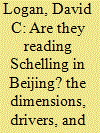

|
|
|
|
|
| Summary/Abstract |
Experts increasingly highlight the dangers of nuclear-conventional entanglement, particularly in the U.S.-China context. This article develops a framework for assessing entanglement and its risks. Applying that framework to China, it finds that Beijing’s missiles are not as entangled as is sometimes feared, but ongoing trends may increase future entanglement. It also presents evidence that, counter to the prevailing wisdom, Chinese entanglement has not emerged as a strategic policy choice but, rather, as the byproduct of more parochial organizational dynamics. Strategic signaling and perception management will be key to controlling escalation risks stemming from nuclear-conventional entanglement in China.
|
|
|
|
|
|
|
|
|
|
|
|
|
|
|
|
| 2 |
ID:
165361
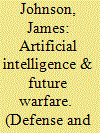

|
|
|
|
|
| Summary/Abstract |
Recent developments in artificial intelligence (AI) suggest that this emerging technology will have a deterministic and potentially transformative influence on military power, strategic competition, and world politics more broadly. After the initial surge of broad speculation in the literature related to AI this article provides some much needed specificity to the debate. It argues that left unchecked the uncertainties and vulnerabilities created by the rapid proliferation and diffusion of AI could become a major potential source of instability and great power strategic rivalry. The article identifies several AI-related innovations and technological developments that will likely have genuine consequences for military applications from a tactical battlefield perspective to the strategic level.
|
|
|
|
|
|
|
|
|
|
|
|
|
|
|
|
| 3 |
ID:
183305


|
|
|
| 4 |
ID:
169191


|
|
|
|
|
| Summary/Abstract |
The US-China relationship is changing in fundamental ways. Currently, the United States and China are engaged in an intensive and costly trade war that, even if resolved through negotiations, will likely not provide the basis for long-term stability. Indeed, it may carry the seeds of future confrontation. More broadly, many of the fundamental ideas that once guided the relationship are being called into question, such as engagement, cooperation, and convergence. The institutional structure of the relationship is also being tested. The well-developed and hard-worn channels of communication have been allowed to atrophy. On both sides, and especially in China, bureaucratic processes are straining to keep up with the growing diversity and complexity of a relationship that is global in scope and consequence.
|
|
|
|
|
|
|
|
|
|
|
|
|
|
|
|
| 5 |
ID:
160384
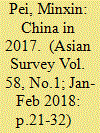

|
|
|
|
|
| Summary/Abstract |
Strongman rule returned to China in 2017 when Xi Jinping secured near-total political dominance. Repression remained intense while the Chinese economy performed reasonably well due to credit support. US–China relations are entering an uncertain phase. Strongman rule is likely to increase the risk of major policy mistakes and deliver few concrete achievements.
|
|
|
|
|
|
|
|
|
|
|
|
|
|
|
|
| 6 |
ID:
179239
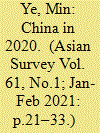

|
|
|
|
|
| Summary/Abstract |
The COVID-19 pandemic wreaked havoc on China, causing tremendous losses. It also accelerated the trend of power concentration, both within the state and inside the Communist Party. With tensions between the US and China mounting in more areas, bilateral relations dropped to the lowest point since the end of the Cold War. On its periphery, China also saw crises of varying intensity over Hong Kong, Taiwan, the Uyghurs, and the disputed border with India.
|
|
|
|
|
|
|
|
|
|
|
|
|
|
|
|
| 7 |
ID:
185197
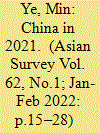

|
|
|
|
|
| Summary/Abstract |
The year 2021 saw unceasing power concentration in China and inside the ruling Communist Party. China persisted with a zero-COVID policy, but at considerable social and economic costs. The investigation of the origins of the pandemic triggered new sparring between China and Western countries. US–China relations continued to sour as the Biden administration kept on with most of the existing China policies and started building a new security network in the Indo-Pacific region. China tightened its control of Hong Kong’s political life, but its effort toward “complete reunification” faced strong resistance across the Taiwan Strait.
|
|
|
|
|
|
|
|
|
|
|
|
|
|
|
|
| 8 |
ID:
190028
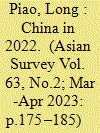

|
|
|
|
|
| Summary/Abstract |
In 2022, president Xi Jinping’s prolonged one-man rule was formalized, further concentrating political authority in the Communist Party of China. Unemployment increased sharply because of the continued zero-COVID policy, and the economy declined significantly, generating pain and dissatisfaction and leading to anti-government protests and demonstrations in several cities. At the end of the year, the Party recognized the crisis and eased the preventive measures. Internationally, the United States maintained its technology blockade, hampering China’s economy.
|
|
|
|
|
|
|
|
|
|
|
|
|
|
|
|
| 9 |
ID:
147341
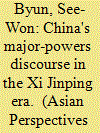

|
|
|
|
|
| Summary/Abstract |
Xi Jinping took office in 2013 with a vision for a “new type of major-power relations” between China and the United States. What does this concept mean and why is it important now? An examination of the current Chinese discourse on major-power relations, as reflected in official and scholarly writings, reveals more continuity than change in China's external orientation. China's major-powers model reinforces (1) peaceful intentions rather than hegemonic aspirations, (2) the primacy of advancing China's domestic development rather than its international position, and (3) tensions between China's dual identities as a rising power and developing economy. The most distinct feature of this model is that it remains a Chinese proposition, posing a question as to the extent to which the United States and China are aligned in perceptions of their future relationship and the international order more broadly.
|
|
|
|
|
|
|
|
|
|
|
|
|
|
|
|
| 10 |
ID:
177882
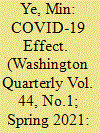

|
|
|
|
|
| Summary/Abstract |
The COVID-19 pandemic has exacerbated geopolitical tensions between the United States and China while restricting policy dialogues, amplifying extreme sentiments, and sidestepping rational observations. The outcomes are extremist and divided narratives, emphasizing China's triumphalism on one hand and inherent weaknesses on the other. Under such narratives, China’s policy voices and actions in combatting the pandemic and economic fallout were under-studied and discounted, with harmful impacts on the US response to the virus, economic recession, and shifting globalization. This paper studies China’s official statements, research reports, and scholarly opinion networks in 2020 and finds that, though there were various policy discussions, the general argument was for expanding China’s globalism during and after the pandemic. Meanwhile, China’s policy actors—national agencies, local governments, and state-owned enterprises (SOEs)—strive to continue globalization and adapt to new realities after COVID-19.
|
|
|
|
|
|
|
|
|
|
|
|
|
|
|
|
| 11 |
ID:
133609
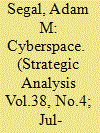

|
|
|
|
|
| Publication |
2014.
|
| Summary/Abstract |
In June 2013, President Obama met with President Xi Jinping at Sunnylands, California. The meeting was seen as a chance for the two leaders to get to know each other in a relatively informal setting so they could address the growing mistrust between their countries. While maritime disputes, trade tensions and differences over how to contain the North Korean and Iranian nuclear programmes were high on the agenda, cyber security-in particular Chinese cyber espionage-was the defining issue of this unusual summit. For the US, the meeting between the two presidents was the culmination of a long campaign to pressure Beijing to reduce the scope and scale of Chinese cyber attacks on the United States.
|
|
|
|
|
|
|
|
|
|
|
|
|
|
|
|
| 12 |
ID:
149538
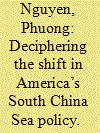

|
|
|
|
|
| Summary/Abstract |
China’s massive reclamation work in the disputed Spratly Islands in the South China Sea between 2013 and 2015 was a turning point in US policy towards the South China Sea. China intends to use the artificial islands it has constructed — and the infrastructure it is in the process of installing on them — for military purposes. While for many years the United States largely positioned itself above the long-simmering territorial and maritime jurisdictional disputes between China and five Southeast Asian countries, the prospect of China using its buildup in the southern reaches of the South China Sea to establish greater control of its near seas, in the process diminishing US access to the waters and airspace of the world’s most critical waterways, prompted a reassessment in Washington about the South China Sea being part of larger US core interests, and its grand strategy in the Western Pacific. Washington has responded to China’s reclamation and construction spree with a new, active strategy that aims to deter China from taking further actions at its reclaimed features that would alter the existing military balance of power in the region and make China pay a “net effect” for its behaviour — should it continue to pursue an aggressive course of actions — by engaging more actively with Southeast Asian partners.
|
|
|
|
|
|
|
|
|
|
|
|
|
|
|
|
| 13 |
ID:
177653
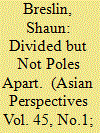

|
|
|
|
|
| Summary/Abstract |
While differences remain, the gap between US and European debates over the likely impact of China’s rise on the
global order has narrowed in recent years. At the same time,
China’s leaders have been more confident in establishing
dichotomized distinctions between their view of how the
world should be ordered and how China will act as a great
power on one hand, and what they depict as the West’s preferences and the typical modus operandi of Western powers
on the other. Despite evidence of ever clearer dividing lines
between different visions of China’s impact on the future of
the global order, this is not the same as a return to bipolarity. The problems of disentangling transnational economic
relations, different levels of followership for potential leaders, and pragmatic considerations of governance efficacy in
diverse issue areas all suggest something other than fixed
bloc-type alliances on either side of a bipolar divide.
|
|
|
|
|
|
|
|
|
|
|
|
|
|
|
|
| 14 |
ID:
177645
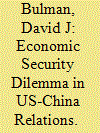

|
|
|
|
|
| Summary/Abstract |
China and the United States are caught in an economic security dilemma. In response to perceived economic aggression,
both countries now feel impelled to bolster domestic economic security through protectionist and retaliatory measures that the other side perceives as threatening. In game
theoretic terms, a mutually beneficial “Stag Hunt” coordination game devolved into an uncooperative “Prisoner’s Dilemma” after the global financial crisis. In the economic security dilemma that emerged under Trump and Xi, both sides
unsuccessfully attempted to coerce opponent behavior, further harming both economies. Using a game framework—as
opposed to a structural or leadership-based account—helps
demonstrate that China’s recent reform reversal and revisionist approaches to the international economic order were
not unavoidable parts of a long-term strategy, but rather developed partially as a response to perceived US aggressions.
|
|
|
|
|
|
|
|
|
|
|
|
|
|
|
|
| 15 |
ID:
179450
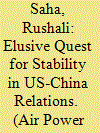

|
|
|
| 16 |
ID:
177657
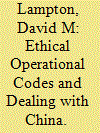

|
|
|
|
|
| Summary/Abstract |
This contribution argues that, without an ethical operational code, scholars’, policymakers’, businesspersons’, and citizens’ policy positions simply become expedient reactions to
perceived problems, opportunities, and interests. Without
ethical footing, policies as a whole will lack coherence, staying power, and persuasive force. Key elements of an ethical
operational code include: philosophical grounding and core
values, concepts of social and historical development, and
rules of thumb derived from an individual’s experience. Providing several examples of China-related policy issues which
would benefit from the ethical operational code approach,
this essay then discusses the analytic elements of an operational code. It concludes by arguing that, in the context of
US-China relations, individuals should develop ethical constructs characterized by patience, more carrots than sticks,
and more open doors than high walls. In what is emerging as
an increasingly ideologically polarized domestic and foreign
policy circumstance in the United States and in U.S.-China
relations, the starting point for an individual needs to be
self-reflection concerning what they believe and why
|
|
|
|
|
|
|
|
|
|
|
|
|
|
|
|
| 17 |
ID:
091431
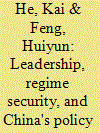

|
|
|
|
|
| Publication |
2009.
|
| Summary/Abstract |
Traditional analyses of Taiwan crises have relied mainly on deterrence theory for their explanatory power. This approach fails to account for China's risk-taking behavior, which can be explained by prospect theory. We suggest that Chinese leaders are more likely to use more risky military coercion against Taiwan's pro-independence movements within a domain of losses, i.e., when their regime faces serious domestic and international challenges to its security. Conversely, Chinese leaders are more likely to employ less risky political pressure to oppose Taiwan's pro-independence forces if their decision making takes place in a domain of gains, i.e., when the security of China's regime is not challenged. We conclude that maintaining a good US-China relationship is the best strategy for the United States to help prevent military crises in the Taiwan Strait.
|
|
|
|
|
|
|
|
|
|
|
|
|
|
|
|
| 18 |
ID:
177646
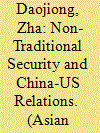

|
|
|
|
|
| Summary/Abstract |
This essay discusses setbacks to societal level of interactions
between the United States and China resulting from the
Trump administration’s turn to comprehensive confrontation. Bilateral cooperation in areas like public health, technology trade and development, law enforcement, and trade
in food and energy has been severely curtailed. Future efforts to repair damage to bilateral relations will have to begin with these and related areas that indisputably have a
direct impact on individual welfare in the two societies.
|
|
|
|
|
|
|
|
|
|
|
|
|
|
|
|
| 19 |
ID:
185984
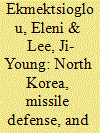

|
|
|
|
|
| Summary/Abstract |
This article examines the relationship between US missile defense and the US-China security dilemma dynamics by developing the concept of diffuse signaling involving the Korean peninsula. We argue that the US’ efforts to bolster deterrence against North Korea’s growing threats through missile defense have resulted in China’s countermeasures of enhancing survivability and penetrability of its second-strike capability, leading to downward spirals of tensions between Beijing and Washington. We explain how three structural factors – geography, the US alliance system, and nuclear asymmetry – have made diffuse signaling salient, thus making it very challenging for the United States to reassure China even when its actions targeted North Korea. The article empirically shows the action-reaction process through which China and the US have come to experience the aggravation of the security dilemma over the Korean peninsula.
|
|
|
|
|
|
|
|
|
|
|
|
|
|
|
|
| 20 |
ID:
172560
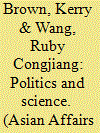

|
|
|
|
|
| Summary/Abstract |
The Coronavirus (2019-nCoV, or COVID-19) outbreak started in the central Hubei province in China. The spread of the disease across China, and now around the globe, is a multi-layered issue that affects both politics and science. On one level, it is a public health crisis in an area where developing China is particularly vulnerable. On another, it sheds light on the issue of governance under Xi Jinping and the strengths and weaknesses of his highly centralised style of rule in contemporary China. Finally, it also speaks to the current atmosphere in geopolitics, where the boundary between China and the world around it, and particularly with the USA, is growing deeper. This article will look at each of these issues in turn. The spread and global impact of the virus has proved to be a fast-moving phenomenon. It is likely to make an impact that will last not just for years, but decades. There is every possibility that globalisation will be recast and reformed, as a result. This is a very initial attempt to understand some of the factors that might go into this, as they can be seen at the time of writing (April 2020).
|
|
|
|
|
|
|
|
|
|
|
|
|
|
|
|
|
|
|
|
|